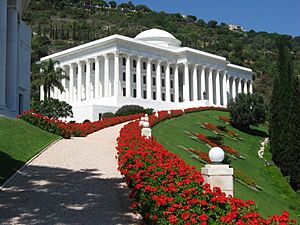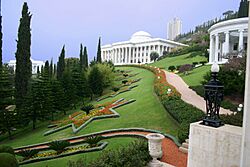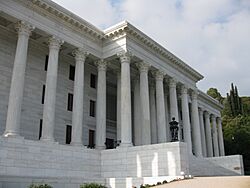Universal House of Justice facts for kids

Seat of the Universal House of Justice
|
|
| Predecessor | International Baháʼí Council |
|---|---|
| Formation | 1963 |
| Type | Baháʼí administration |
| Headquarters | Baháʼí World Centre |
| Location | |
The Universal House of Justice is the main governing body of the Baháʼí Faith. It has nine members and leads the worldwide Baháʼí community. Baháʼu'lláh, who founded the Baháʼí Faith, imagined this group. He wanted it to create new rules for things not already covered in Baháʼí writings. This helps the Baháʼí Faith grow and change with the times. The first Universal House of Justice was chosen in 1963. New members are elected every five years. People from Baháʼí National Spiritual Assemblies around the world vote for them.
The Universal House of Justice guides the Baháʼí community. It does this mainly through multi-year plans and yearly messages. These messages are given during the Ridván festival. They focus on growing the number of Local Spiritual Assemblies. They also help translate Baháʼí books and build Baháʼí Centers. Other goals include finishing Baháʼí Houses of Worship and holding big meetings. They also work on education, helping women, and teaching kids and teens about spirituality. Family life, helping communities, and group worship are also important. The Universal House of Justice has also helped bring attention to unfair treatment of Baháʼís in Iran.
The books and papers from the Universal House of Justice are very important. Baháʼís believe its decisions are always right. It can make new laws for things not in the Baháʼí holy books. However, it does not do this very often.
The Seat of the Universal House of Justice is in Haifa, Israel. It is on the side of Mount Carmel. The members of the House of Justice live there. The most recent election was on April 29, 2023. In the Baháʼí Faith, most elected jobs are open to both men and women. But only men can be members of the Universal House of Justice. Baháʼí writings say the reason for this will be clear in the future.
Contents
How the Universal House of Justice Started
Baháʼu'lláh, the founder of the Baháʼí Faith, first wrote about the House of Justice. He described its purpose in his book, the Kitáb-i-Aqdas. He also mentioned it in other writings, like his Tablets of Baháʼu'lláh. Baháʼu'lláh said the Universal House of Justice would lead the religion. It would also handle new issues he had not covered. He believed its members would be guided by God. They would also care for all people and protect their honor.
Later, ʻAbdu'l-Bahá, Baháʼu'lláh's son, gave more details. In his Will and Testament, he explained how it would work. He said it would be protected by Baháʼu'lláh and would not make mistakes. He also said Baháʼís must obey it. ʻAbdu'l-Bahá used the name "Universal House of Justice" to show it was the highest body. This was different from local "Houses of Justice" in each community. He also said decisions could be made by a majority vote. But he preferred everyone to agree. He confirmed that only men could be members. He said the reason for this would become clear later.
Both ʻAbdu'l-Bahá and Shoghi Effendi thought about creating the Universal House of Justice. But they decided not to at that time. Shoghi Effendi felt the Baháʼí groups were not strong enough yet. There were only a few national and local Baháʼí groups. So, Shoghi Effendi worked to build a strong system. He wanted to prepare for the election of the Universal House of Justice.
In 1951, there were nine National Spiritual Assemblies. Shoghi Effendi then chose members for the International Baháʼí Council. He called it an early form of the international House of Justice. After Shoghi Effendi passed away in 1957, the Hands of the Cause led the religion. They announced that the Universal House of Justice would be elected in 1963. This was at the end of the Ten Year Crusade. This was a plan for teaching the Baháʼí Faith around the world.
In 1961, the International Baháʼí Council became an elected group. Members of all National Spiritual Assemblies voted for its members. Then, in April 1963, the first Universal House of Justice was elected. This happened six years after Shoghi Effendi's passing. Fifty-six National Spiritual Assemblies voted. The election date was special. It was 100 years after Baháʼu'lláh first shared his message. This happened in the Garden of Ridván in April 1863. Since then, the Universal House of Justice has led the religion. Individual members do not have power on their own. They only have power as a group. In 1972, the Universal House of Justice published its rules.
How Members Are Chosen
The Universal House of Justice is elected in a special way. It uses a secret ballot and a simple vote. Adult Baháʼís around the world take part in a three-step process. There are no nominations or campaigns. Any adult male Baháʼí can be elected. The election happens every five years. It takes place during a meeting of members from National Spiritual Assemblies (NSAs). These NSA members are chosen by Baháʼís in their own countries. Each NSA member votes for nine adult male Baháʼís. Votes can be sent by mail or brought by delegates. The nine people with the most votes become members of the Universal House of Justice.
In 2013, over 1500 votes were cast. About 400 of these were absentee ballots. This election was also special because it was 50 years after the first election in 1963.
The most recent full election was on April 29, 2023.
What the Universal House of Justice Does
Today, the Universal House of Justice guides the Baháʼí community worldwide. Baháʼu'lláh said its main jobs include spreading God's message. It also protects the laws and manages community matters. It helps educate people's souls and makes sure children get an education. It works to make the world better for everyone. This includes ending extreme wealth and poverty. It also cares for older people and those who are sick and poor.
According to its rules, some of its duties are:
- Helping Baháʼís live spiritual lives, both alone and together.
- Keeping, translating, and sharing Baháʼí holy books.
- Protecting the worldwide Baháʼí community from harm and unfair treatment.
- Taking care of and growing the spiritual and administrative center of the Baháʼí Faith.
- Helping the Baháʼí community and its administration grow and become stronger.
- Protecting people's personal rights, freedoms, and new ideas.
- Following Baháʼí rules and principles.
- Creating, changing, or removing laws not in the Baháʼí holy books. This is done as times change.
- Deciding on actions against those who break Baháʼí law.
- Settling disagreements that are brought to it.
- Managing all religious money and gifts, like Huqúqu'lláh.
The Universal House of Justice is also told to help all people. It works to bring lasting peace among countries. It also helps with "training of peoples, the up building of nations, the protection of man and the safeguarding of his honour."
Making New Rules
The Universal House of Justice is also in charge of helping the Baháʼí Faith change as society changes. So, it can make new laws for things not clearly written in the Baháʼí holy books. It can change or remove its own laws as needed. But it cannot change any laws that are clearly written in the Baháʼí holy texts.
Current Members
The people who are currently members of the Universal House of Justice are:
- Paul Lample (since 2005)
- Payman Mohajer (since 2005)
- Shahriar Razavi (since 2008)
- Ayman Rouhani (since 2013)
- Chuungu Malitonga (since 2013)
- Juan Francisco Mora (since 2018)
- Praveen Mallik (since 2018)
- Albert Nshisu Nsunga (since 2023)
- Andrej Donoval (since 2023)
Past Members
The first election in 1963 chose members from different groups. Five members came from the International Baháʼí Council. Two were from the National Spiritual Assembly (NSA) of the United States. One was from the NSA of Britain, and one from the NSA of India.
Members are listed by the year they were first elected. Since 1963, full elections happen every five years. There have also been five special elections to fill empty spots. These were in 1982, 1987, 2000, 2005, and 2010. All members have continued to serve after being re-elected. Amoz Gibson, Charles Wolcott, and Adib Taherzadeh passed away while serving. Other past members were allowed to retire.
| 1963 | 1968 | 1973 | 1978 | 1982 | 1983 | 1987 | 1988 | 1993 | 1998 | 2000 | 2003 | 2005 | 2008 | 2010 | 2013 | 2018 | 2023 |
|---|---|---|---|---|---|---|---|---|---|---|---|---|---|---|---|---|---|
| Lutfu'lláh Hakím | David Ruhe | Farzam Arbab* | Ayman Rouhani | ||||||||||||||
| Amoz Gibson | Glenford Mitchell | Gustavo Correa | Praveen Mallik | ||||||||||||||
| Charles Wolcott | Peter Khan | Stephen Hall | Andrej Donoval | ||||||||||||||
| David Hofman | Hooper Dunbar | Stephen Birkland | Albert Nshisu Nsunga | ||||||||||||||
| Borrah Kavelin | Adib Taherzadeh | Kiser Barnes | Chuungu Malitonga | ||||||||||||||
| Hugh Chance | J. Douglas Martin | Paul Lample | |||||||||||||||
| Alí Nakhjavání | Hartmut Grossmann | Shahriar Razavi | |||||||||||||||
| Hushmand Fatheazam | Firaydoun Javaheri | Juan Francisco Mora | |||||||||||||||
| Ian Semple | Payman Mohajer | ||||||||||||||||
- Farzam Arbab (October 27, 1941 – September 25, 2020), born in Tehran, Iran was a member from 1993 until he retired in 2013, at the age of 71.
See also
 In Spanish: Casa Universal de Justicia para niños
In Spanish: Casa Universal de Justicia para niños
- Baháʼí administration
 | Charles R. Drew |
 | Benjamin Banneker |
 | Jane C. Wright |
 | Roger Arliner Young |



